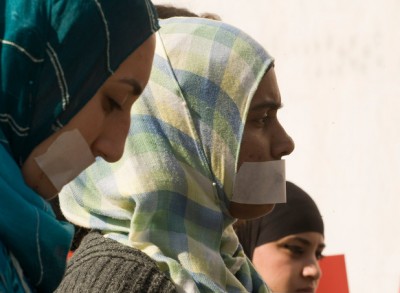False Claims of Anti-Semitism Climb on US Campuses: Allegations Based on Speech Critical of Israeli Policy

Israel advocates are attempting to stifle Palestine solidarity activism on US campuses. (ZUMA Press/Newscom)
Sixty false allegations of anti-Semitism have been recorded against students or faculty in the US since January “based solely on speech critical of Israeli policy,” according to a study by lawyers.
Attorneys with Palestine Solidarity Legal Support (PSLS) published a report on Monday documenting 84 incidents of repression on college campuses across the US from 1 January to 30 April in which Palestine solidarity activists and professors were targeted or smeared because of their criticism of Israel.
Twenty-four of the documented cases were incidents “involving accusations of support for terrorism made against students or faculty, based solely on speech critical of Israeli policy.”
“The surge in accusations of anti-Semitism to silence advocacy for Palestinian rights relies on the conflation of anti-Semitism with criticism of Israeli policy,” the report states.
“Attempting to dictate speech”
In recent weeks, lawmakers have attempted to codify this conflation with a resolution in the California legislature, using the US State Department’s definition of anti-Semitism that considers “demonizing,” “delegitimizing” or holding Israel to a “double standard” as anti-Semitic.
As The Electronic Intifada has reported, the US State Department’s definition of anti-Semitism is based on the European Union’s long-discredited “working definition” of anti-Semitism.
PSLS says that the State Department’s definition “is being proposed … where Israel advocacy groups are attempting to dictate what is acceptable speech when it comes to Israel.”
Backed by anti-Palestinian organizations such as the Lawfare Project — which aims to protect Israel from legal accountability — the California resolution openly labels criticism of Israel’s policies as anti-Semitic.
Dima Khalidi, director and founder of PSLS and cooperating counsel with the Center for Constitutional Rights, says in Monday’s press release that “the smearing, harassing and intimidation of Palestinian rights advocates has serious consequences.”
Khalidi adds, “Not only does it harm the reputations and careers of students and scholars, but it also encourages censorship of students and scholars, thereby trampling their First Amendment rights and limiting debate and the free exchange of ideas at our nation’s schools.”
Surge
Accusations of anti-Semitism related to Palestine solidarity campaigning have surged, especially on college campuses where support for Palestinian rights is growing.
Attempting to silence such activism and smear its supporters, Israel-aligned organizations nationwide have urged universities to crack down on Palestine activists,have invested millions of dollars to “[fighting] the delegitimizing of the State of Israel” and have partnered with right-wing on-campus groups who accuse human rights activists of anti-Semitism.
In Boston, for example, student organizers at Northeastern University were told in March that their divestment resolution — which aimed to pull the university’s investments in companies which profit from Israel’s human rights abuses — would cause Jewish students emotional distress and could “bring anti-Semitism to the campus.”
A similar accusation was hurled at Palestine solidarity organizers at the University of Toledo in Ohio during their divestment debate in February.
At Stanford University in California, the Students of Color Coalition (SOCC) was accused of anti-Semitism during an interview with an Israel-aligned candidate who sought the coalition’s endorsement in a recent election. The coalition vehemently denied the allegations while the Anti-Defamation League — a leading Israel lobby organization — immediately condemned SOCC and pointed to growing support for divestment initiatives on campus as a reason for the “flourishing” of “anti-Semitism.”
Muslim students at Harvard University were falsely accused of anti-Semitism by right-wing Zionist media in 2013.
And when the University of California at Los Angeles recently passed a resolution addressing issues of anti-Semitism on campus, by using the US State Department’s definition it “brand[ed] advocates for Palestinian human rights as anti-Semitic by blurring the important distinction between criticism of Israel as a nation-state and anti-Semitism,”according to PSLS.
“Silencing legitimate criticism”
Jewish activists across the US are quickly mobilizing to oppose the attempts by anti-Palestinian organizations and governmental bodies to conflate Palestine solidarity activism with anti-Semitism.
More than 250 members of the Jewish Voice for Peace Academic Advisory Council — which includes high-profile academics and scholars — have signed an open letterdemanding that the US State Department “revise its definition of anti-Semitism in order to prevent the charge of anti-Semitism from being misused to silence critics of Israel.”
“As academics committed to addressing anti-Semitism and other forms of oppression, we oppose ongoing efforts to silence legitimate criticism of the state of Israel by codifying its inclusion in the definition of anti-Semitism,” the letter states.
Jewish Voice for Peace says that nearly 16,000 supporters across the US have signed a petiton in support of its academic advisory council’s letter.

